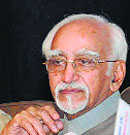
M. Hamid Ansari
M. Hamid Ansari
Writers have a social responsibility since their work influences and helps shape public perceptions. The reading public, consciously or otherwise, judges the social purpose, intellectual depth and emotional sincerity of their writings. Their work is and should be reflective of contemporary cultural mores and of national identity.
We thus come to the critical question: what is Indian national identity?
There could be two ways of answering the question: the first would be a priori or deductive, independent of experience or facts; the second would be inductive, based on facts and experience. The first, on assumed infallibility of tradition, suggests uniformity, homogeneity, oneness; the second, based on ground reality, identifies diversity, heterogeneity, complexity. It is truism that all perceptions have to be tested on discernable facts. What then is the factual reality of the Indian social landscape?
The Anthropological Survey of India indicates that our land has 4,635 communities diverse in biological traits, dress, languages, form of worship, occupation, food habits, and kinship patterns. The Linguistic Survey of India indicates that apart from the 22 languages in the Eighth Schedule of the Constitution, there are 100 other languages and thousands of dialects in the country.
As a result, the identity of India is plural and diverse, a consequence of coming together of people with such different social and cultural traits. It is this plurality that constitutes Indian identity expressed in the Constitution through the principles of democracy and secularism. It is not a melting pot because each ingredient retains its identity. It is, perhaps, a salad bowl. Jawaharlal Nehru said it is a palimpsest on which the imprint of succeeding generations has unrecognisably merged.
For the same reason, Indian culture is not to be conceived as a static phenomenon tracing its identity to a single unchanging source; instead, it is dynamic and interrogates critically and creatively all that is new.
This, then is the reality. Can we homogenise it? Can we initiate a process of assimilation? In a democratic polity, how is any ingredient to be subsumed in another? Can we visualise an India that is non-democratic, non-plural, non-secular?
Why then is effort under way to subsume diversity in a notional identity? Is its purpose to erase, subjugate or dominate this diversity and replace it with an imagined uniformity based on a version of history that corresponds neither to the authentic record of India's past nor to the rich diversity of her present?
Alternatively, our approach could be accommodative, based on the principles of pluralism and secularism with three ingredients:
- Energetic engagement with diversity and educating all sections of the public, particularly students, about the uniqueness of our structure and benefits flowing from it
- Going beyond mere tolerance, seeking active understanding across line of differences and considering community disharmony a threat to national security and deal with it in the same manner as other such threats
- Having a continuous inter-community, inter-faith and cross-cultural dialogue, of speaking and listening in a process that reveals both common understanding and real differences.
History, thus, itself has becomes a site for struggle; it draws within its ambit all those who register and interpret human experience, particularly the writers. As citizens, they cannot remain oblivious to what happens in the polity. While remaining committed to their chosen art, their social responsibility requires that they use their art to guide the public and lead them out of the poisonous haze of ignorance, superstition and unreasoned prejudice and to ensure that our secular culture and liberal democracy are preserved.
We live in difficult times. The hitherto accepted norms of Indian culture are being re-packaged, distorted out of shape. The values of liberal nationalism are sought to be substituted by illiberal doctrines and practices that impact adversely on individual freedoms guaranteed by the Constitution of India. All citizens, particularly those who mould public perceptions through their work, need to respond to this challenge.
India has an age-long tradition of religious and philosophical dissent and of bringing forth multiple traditions of authenticity. Indians take pride in being argumentative. Again and again, our writers have penned anthems of resistance; many have recalled the words of Faiz Ahmad Faiz's clarion call in the poem Bol.



























